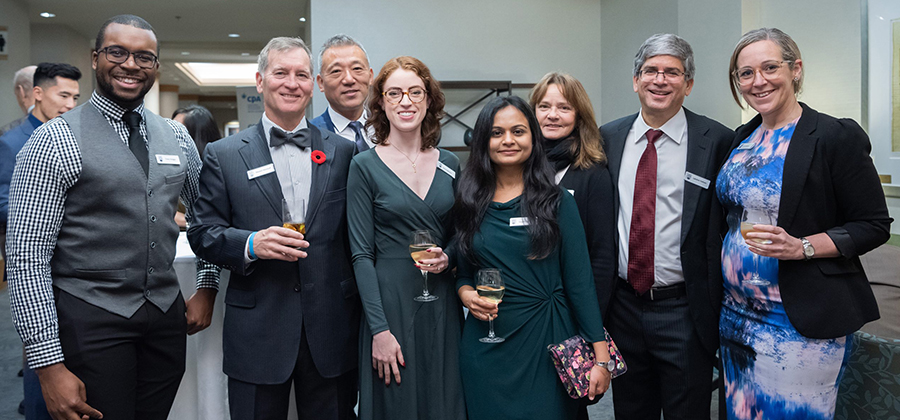Mental health research at UBC has received a significant boost for young investigators to build greater capacity for innovative, translational research in mental health.

The Marshalls at the National Research Awards Dinner with Marshall Scholars and Fellows Awards winners Travis Hodges, Emma Moreton and Gayatri Saraf. Accompanying them are Dr. Wei Yi Song and Dr. Lakshmi Yatham of the Department of Psychiatry, and Erin Bartlett of the Faculty of Medicine.
This was made possible thanks to the commitment of Sunny and Stewart Marshall to the Faculty of Medicine’s Institute of Mental Health (IMH) to create the Marshall Scholars and Fellows Awards to fund up to five post-graduate fellows and fifteen masters-level scholars per year. Their vision was supported by $675,000 in funding from the Faculty of Medicine. Together they helped to unlock a $940,000 investment in the Faculty of Medicine from the BC Ministry of Advanced Education, Skills and Training’s BC Graduate Scholarship Fund, which supports students tackling real-world problems in medicine, sustainability and technology. Nearly half of the BC Graduate Scholarships allocated to the Faculty of Medicine will be directed to the Marshall Scholars and Fellows Awards program.
The awards will catalyze translational medicine in mental health, ensuring fundamental discoveries are applied in a clinical setting through a bench-to-bedside approach. The IMH recently unveiled the inaugural recipients of the award.
“A lot of us will experience mental illness in our lifetimes, yet we still know very little about it. We’re thrilled to support exceptional people like Travis and Melissa, who have the skills to make a lasting impact and destigmatize these issues through research and education.”
Sunny and Stewart Marshall
Travis Ellington Hodges is one of this year’s Marshall Fellows. He is researching the neural mechanisms that underpin pessimistic thinking, a common aspect of depression, with particular attention to how it differs according to age and sex.
“We see lots of treatments based on research solely done in males. However, we’ve found in our lab that many do not work the same in females, so we want to see if there are sex-specific effects related to inflammation and the growth of new neurons in the brain,” says Hodges. “My background includes considerable study in the differences between stressors that affect adolescents and adults, so my research as a Marshall Fellow will hopefully lead to multiple treatments tailored for vulnerable groups, such as teenage girls.”
Melissa Woodward, another new Marshall Fellow, will use eye scans to investigate potential changes in the brain of individuals with schizophrenia.
“My project is going to use retinal imaging similar to how an eye doctor would use,” she says. “These high-resolution images give a more detailed picture of the retina and blood vessels. Any changes in them may indicate changes in the brain—there is lots of evidence that people with schizophrenia show differences in their retinas—and point to possible cardiovascular issues too.”
The Marshall’s gift provides a stable source of funding for new B.C. researchers like Hodges and Woodward. It will also be instrumental in attracting and developing future talent in the field of mental health, while accelerating the remarkable work already underway at the IMH.
Dr. Lakshmi Yatham, a professor and head of the Department of Psychiatry and director of the IMH, recognizes the great impact the Marshall gift will have in transforming the lives of people experiencing mental health concerns.
“Mental health research has traditionally been underfunded compared to other areas, so this gift is essential to our goal of identifying new interventions to transform the lives of people experiencing mental health concerns,” says Dr. Yatham.